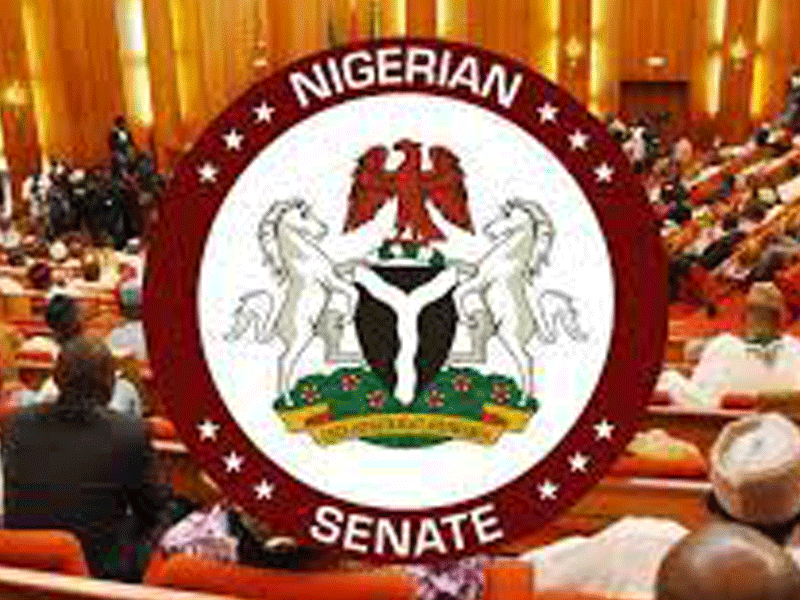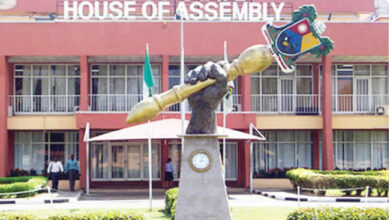
• Retains much criticised provision of old law which gives INEC discretion on mode of transition
•Slashes election notice deadline from 360 to 180 days
• Discards proposed 10-year ban from politics over vote-buying
•PDP: Lawmakers’ action shameful, harmful to democratic consolidation
Chuks Okocha and Sunday Aborisade in Abuja
Nigeria’s Senate, yesterday, came under blistering fire for what many Nigerians described as a grave betrayal of public trust, after lawmakers disappointed widespread expectations by passing an amended Electoral Act that rejected mandatory real-time electronic upload of election results from polling units, a reform widely seen as critical to restoring confidence in the nation’s troubled electoral process.
In October 2023, the Supreme Court of Nigeria ruled that the electronic transmission of election results was not mandatory under the Electoral Act 2022.
The Court affirmed that the Independent National Electoral Commission (INEC) had the legal authority and discretion to determine the specific mode for transmitting and collating election results.
The apex court clarified that the INEC Result Viewing (IReV) portal was not a collation system and was intended only for public viewing because the 2022 Electoral Act did not recognise it as a collation instrument.
It further ruled that failure or unavailability of results on IReV did not invalidate an election outcome or halt the manual collation process.
The ruling emphasised that the Electoral Act 2022 did not explicitly mandate “electronic transmission” only; rather, it allowe INEC to prescribe any manner it deemed fit, which might include manual or electronic methods.
This decision was part of the final judgment dismissing appeals by Atiku Abubakar (PDP) and Peter Obi (Labour Party), thereby affirming the victory of President Bola Tinubu.
The decision taken during the passage of the Electoral Act (Repeal and Enactment) Bill, 2026, effectively retained the contentious provisions of the 2022 law on results transmission, triggering outrage from opposition parties, civil society and pro-democracy advocates, who warned that the move undermined democratic consolidation.
By voting down a proposal that would have expressly mandated presiding officers to upload polling unit results to INEC portal in real time, the Senate opted for continuity over reform, even as it moved to amend other aspects of the electoral framework by shortening election timelines, revising penalties for electoral offences and formally replacing the smart card reader with the Bimodal Voter Accreditation System (BVAS).
The Senate specifically rejected a proposal of its Committee on Electoral Matters to mandate real-time electronic transmission of election results from polling units while retaining electronic transmission as provided under the 2022 Electoral Act.
The action of the senators came to many Nigerians as a rude shock because their counterparts in the House of Representatives had passed the landmark provision two months ago which drew applause from stakeholders, who saw it as a major step to guaranteeing electoral integrity in the country.
The decision on results transmission, the most contentious issue during clause-by-clause consideration, saw lawmakers vote down a recommendation by the Senate Committee on Electoral Matters to compel presiding officers to upload polling unit results to the Independent National Electoral Commission’s (INEC) IREV portal in real time.
Instead, the Senate adopted the existing Section 60 of the 2022 Act, which required results to be electronically transmitted “in a manner as prescribed by the Commission” after announcement at the polling unit and transfer to the next level of collation.
Protest Over Conference Committee Composition Tears Senate Apart
The chamber was, however, thrown into confusion after Senate President Godswill Akpabio announced the membership of the Conference committee of the red chamber that would meet with their counterpart in the House of Representatives.
The confrontation was actually between Senators Simon Lalong and Asuquo Ekpenyong, which was caused by the observation of northern senators, led by Ali Ndume, who protested the non-inclusion of Lalong, chairman of the Electoral Matters panel among the Conference committee.
The development led to an an uproar for a few minutes before Akpabio quickly announced Lalong as the Chairman of the Conference committee and his quick intervention doused the tension.
During the argument, Lalong was seen telling Ekpeyong to learn how to speak to Elders and stop being rude to him.
“Go learn how to speak to your elders and stop talking to me in in such rude manner,” Lalong shouted at Ekpeyong
Under the retained provision, presiding officers were to count votes at the polling unit, record the scores on prescribed forms, announce the results, provide copies to polling agents and security personnel where available, and transmit results electronically as directed by INEC.
Any willful contravention will attract a fine of up to N500,000 or imprisonment for at least six months.
The rejected proposal would have expressly compelled real-time upload to IREV immediately after signing of Form EC8A, with penalties of not less than N500,000 or six months’ imprisonment or both.
Senators opposed to the amendment argued that codifying “real-time” could introduce ambiguity and operational risks, particularly in areas with poor network coverage.
Chairman of the Senate Committee on Media and Public Affairs, Senator Adeyemi Adaramodu, said the dispute was largely semantic. “Who determines real-time?” he asked.
He said, “Election result transmission should not be based on grammar. Results will be transmitted electronically for public access, and once it is mandatory, it is no longer left to discretion. There is no way a presiding officer can falsely claim there is no network without the community knowing.”
Beyond results transmission, the Senate approved far-reaching changes to election timelines. The lawmakers slashed the notice period for elections from 360 days to 180 days before the end of the current administration’s tenure.
Political parties’ deadlines for submitting candidates’ lists were reduced from 120 days to 90 days, while the deadline for nomination of candidates was also cut from 180 days to 90 days.
In a bid to tighten compliance and curb electoral malpractices, the Senate increased the fine for unlawful possession of voters’ cards to N5 million, but rejected a proposal to impose a 10-year ban from political activities for vote buying.
Instead, it adopted a higher monetary penalty, raising the fine from N500,000 to N5 million. Lawmakers also deleted the smart card reader from the law and formally replaced it with BVAS, while retaining electronic transmission of results.
The amendments further clarified consequences for candidates disqualified for submitting fake documents, barring parties from replacing such candidates after elections and providing for fresh polls excluding the disqualified candidate and party where necessary.
Akpabio, who presided over the session that stretched into the evening, insisted that claims that the Senate had rejected electronic transmission were false.
He said: “Electronic transmission has always been in our hearts. What we did was to retain what worked in 2022. Retaining the previous provision means electronic transmission remains part of our law. We are moving forward, not backwards.”
Akpabio commended senators for their stamina and bipartisan engagement, noting that the chamber remained full well into the evening.
He also announced the constitution of a harmonisation conference committee to reconcile differences between the Senate and House of Representatives versions of the bill.
Senator Simon Lalong will chair the committee, with members drawn from all geopolitical zones, including Senators Adamu Aliero, Orji Uzor Kalu, Abba Moro, Asuquo Ekpeyong, Aminu Iya Abbas and Tokunbo Abiru. Senator Adeniyi Adegbomire was added to provide legal guidance.
The Senate President said the committee would work expeditiously to return a harmonised version within the month, paving the way for presidential assent and timely preparations for future elections.
He added that the Senate would adjourn plenary to focus on the 2026 budget, with ministry-by-ministry defence schedules to be released by the Appropriations Committee.
Addressing journalists after the session, Adaramodu reiterated that electronic transmission to the public remained intact, with physical result forms serving as corroborative evidence.
He said the reforms were designed to protect voter intent, deter fraud through stiffer fines, and ensure that disqualification for illegality did not upend the will of millions without a fresh, lawful contest.
With the bill passed at third reading, attention has now shifted to the conference committee and the final shape of Nigeria’s electoral framework ahead of the next general election.
But in a reaction, the Peoples Democratic Party (PDP) slammed the Senate over the rejection of electronic transmission of results, describing it as shameful to democratic consolidation
In a statement by the National Publicity Secretary of the PDP, Ini Ememobong, the party said, “Today, after an intentional and protracted delay , the Senate, while passing the amendment to the Electoral Act, rejected the electronic transmission of results at the polling units.
‘’This rejection is most shameful and unfortunate, attracting condemnation from all democratic-minded persons. We charge our lawmakers to remember that they are delegates of power invested in them by the voters in their various constituencies and must endeavour to mirror their desires and wishes at all times.”
According to the party, it was common knowledge that the majority of Nigerians all across the 109 Senatorial Districts desired electoral sanctity which was better guaranteed through the electronic transmission of votes from the polling units.
‘’We are all witnesses to the widespread practice of altering results before it gets to the collation centre or at the collation centre. This electronic transmission would have brought an end to this ignoble practice that has been deployed by politicians to win elections against the wishes of the people expressed through the ballot.
‘’This rejection is a clear indication that the National Assembly is not willing or ready to legislate for electoral sanctity and democratic consolidation. This is indeed a sad day for electoral democracy.
“We hereby call the National Assembly to immediately reconsider its stand on this matter and take steps to pass the amendment approving the electronic transmission of results.
‘’This is the minimum amendment. That can increase faith in the electoral process, without which the apathy will be worse than the last general election, which is greatly unhelpful to democracy,’’ the PDP stated.





